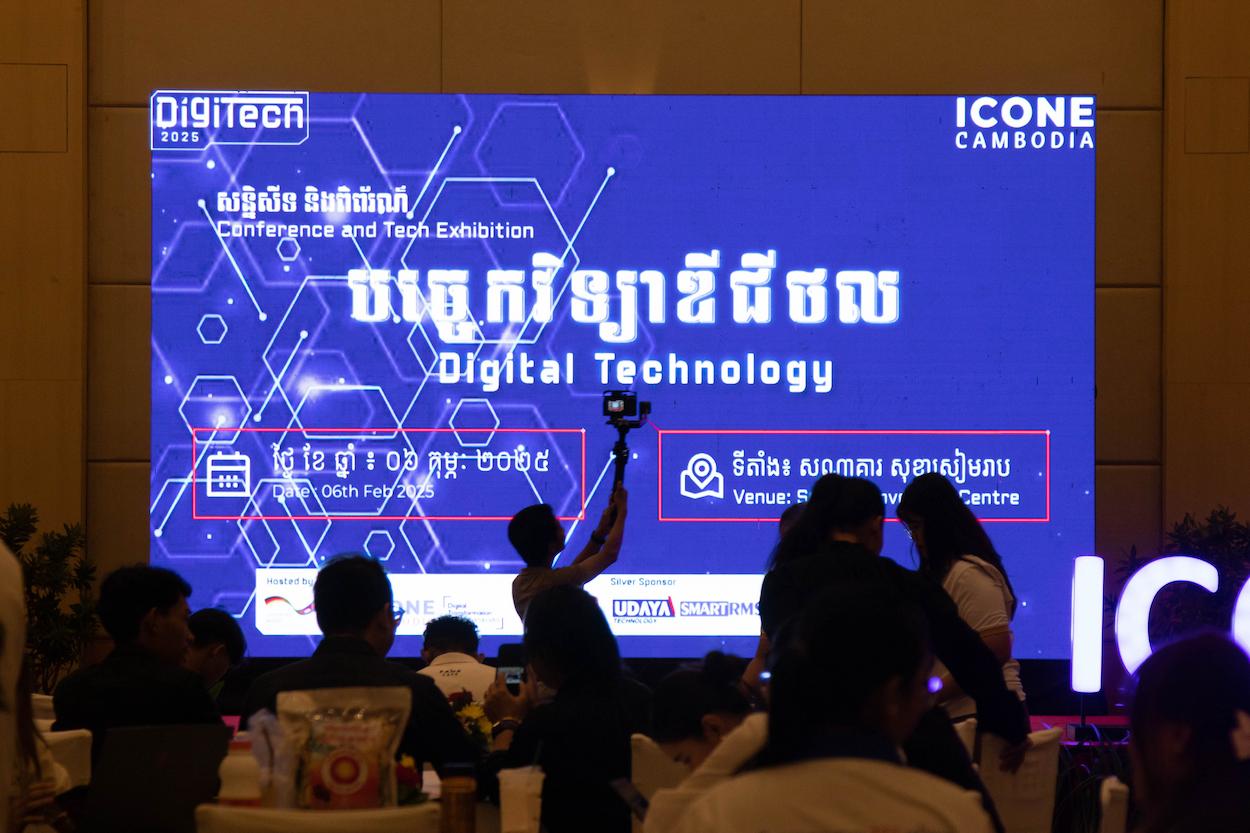
GIZ ICONE recently organised the Digital Technology Conference and Exhibition, ‘DIGITECH-25,’ in Siem Reap province on February 6, 2025, under the theme ‘Unlocking the Power of Data,’ aiming to bring knowledge about data to enterprise owners in the northwestern provinces of Cambodia.
Organising DigiTech-25 with a focus on data follows its event in 2023, as part of the GIZ ICONE program under the German International Development Agency (GIZ).
GIZ's Improved Competitiveness of National Enterprises (ICONE) in the northwestern regions of Cambodia focuses on three pillars: first, productivity of companies and their employees; second, efficiency in operations and resource use; and third, improving innovation and the capacity to innovate.
The ICONE program began in 2022, and DigiTech-23 was organised to promote digitalisation in Cambodian provinces. The Head of GIZ ICONE said there was very "little flow of information and technology from Phnom Penh to Cambodian provinces" back then.
The topics during DigiTech-25 provided examples of how data matters for business owners in these provinces - from understanding their customers' wants and preferences to improving operations and scaling their businesses.
Speaking to B2B Cambodia, Dr. Stefan Hanselmann, Head of GIZ ICONE, stated that for business owners in this region, data can provide entrepreneurs with the facts and figures that allow them to make fact-driven decisions.
Since GIZ’s ICONE program began, he noted that awareness of data is definitely increasing, with more companies able to generate and collect data. The ICONE program has been intensively working with companies to assist them in integrating technologies that help with data collection and analysis.
“I think it's slowly taking root. It's slowly coming to the provinces and companies are more and more ready to engage and embark on this journey. And it is a journey,” he said.
Why does data matter? Dr.Hanselmann said data allows for informed decisions to be made rather than relying on gut feelings or intuition.
He said data is not new and that everything we do and everything we look at is basically data of some sort and form. In the context of enterprises, data can help identify who their customers are, the products they buy, and the prices they pay for those products, etc.
Successful Business in Utilising Data - Our Pharmacy
During the event, Sor Sampiseth, business owner of ‘Our Pharmacy,’ a Siem Reap-grown enterprise that participated in the ICONE programme, shared how data has contributed to his business growth.

Currently, Our Pharmacy has expanded to three other cities; Battambang, Banteay Meanchey, and Phnom Penh, in addition to Siem Reap, and now totals 15 branches. With data in place, it helps his business serve over 1 million customers per year and they employ around 90 staff.
Speaking with B2B Cambodia, Piseth noted that prior to joining the programme, the company relied on basic data entry, with information limited to sales data and an inventory management system. However, after recognising the importance of data, it began to be used in other areas of his business as well.
“[Before], we just keyed in data. But after we understood the importance of data, we started to collect and analyse it, and we [addressed] what we had done wrong in the past. In Our Pharmacy, we leverage data collection for our strategy, scaling, and inventory management. We also use data to monitor our operations and manage our staff,” he added.
In his presentation, he explained that data can also be used in improving operational efficiency, enhancing sales and marketing, strengthening relationships with customers, and boosting the skills and knowledge of staff.
Additionally, data can also be used to understand the competitive market, reduce risks, and help predict future growth.
Collecting Data Is Not Too Difficult or Too Costly
Nikolas Hatz, a Tourism Development Expert, stated in an interview with us that companies primarily operate within contexts they are already familiar with. He suggests that if they wish to develop further, such as developing new products, they need to understand their customers' needs and wants. This is where market data comes in handy.
Hatz explained that data is already available in the form of publications from government or research institutions. Industry centers and experts, as well as entrepreneurs, can also collect their own data through surveys, questionnaires, or direct conversations with customers about their needs and preferences.

He emphasised that collecting data is not difficult. First of all, it's important for companies to examine the data they already have. He noted that every company possesses data, such as who their customers are, how much they buy, and when they make purchases.
“A lot of things happen in daily routines that you may not even be aware of, but which could be relevant market data. So you could have a lot of internal data that is already there, which can be a good starting point,” he said.
Secondary data can also be tracked and he added, “It's important for small businesses to be aware of what's happening all around them so that they can adapt to the market context.”
Data in Support of Fundraising for Entrepreneurs
Hassan Hajam, Executive Director of Platform Impact and one of the speakers at DigiTech-25, told B2B Cambodia that his message to entrepreneurs was that they need to be data-driven if they want to access funding in the future, including from impact investors.
In his role at Platform Impact, he said he creates a bridge between those entrepreneurs and international impact investors, and solid data from entrepreneurs is extremely needed, such as legal data, operational, commercial, financial, social, and environmental data.
“So getting access to finance is not only about numbers, but it's also about proper governance, a proper financial structure, and a proper organisational structure.”
Blockchain Data in Food Traceability - Building Opportunities for Exports
In the food sector, food manufacturing businesses can benefit from data-driven tools such as blockchain to optimise the manufacturing process, reduce food waste, and increase profits.
“They can also export their products to the global market without issues,” said An Dami, CEO of Future Senses, a blockchain, AI, and digital transformation company located in South Korea.
Future Senses is currently partnered with the local Cambodian company Consatech, working on projects related to pepper and cashew production in Cambodia.
With blockchain data, companies can also meet international regulations if they wish to export products overseas, as global regulations are increasingly affecting Cambodia, such as the US FDA’s rule on food traceability and similar regulations in the European market.
“These rules will take effect starting January 2026, so manufacturers and distributors should be prepared,” she said.